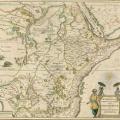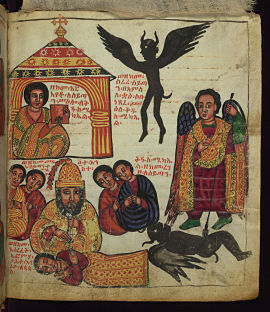8. Solomon, Socrates, and Other Sages: Early Ethiopian Philosophy
Translations of religious and philosophical texts into Ge’ez, a national epic called the Kebra Nagast, and other developments in the story of philosophy in Ethiopia.
Themes:
• A. Bausi, “Translations in Late Antique Ethiopia,” in F. Crevatin (ed.), Egitto crocevia di traduzioni (Trieste: 2018), 69-99.
• J.M. Harden, An Introduction to Ethiopic Christian Literature (Madras: 1926).
• M. Kebede, “The Ethiopian Conception of Time and Modernity,” in C. Jeffers (ed.), Listening to Ourselves: A Multilingual Anthology of African Philosophy (Albany: 2013), 15-37.
• S. Kelly (ed.), A Companion to Medieval Ethiopia and Eritrea (Leiden: 2020).
• R. Pankhurst, The Ethiopians: A History (Malden: 1998).
• B.E. Perry (ed.), Secundus the Silent Philosopher (Ithaca: 1964).
• I. Shahid, "The Kebra Nagast in Light of Recent Research," Le Muséon 89 (1976), 133-78
• C. Sumner, Ethiopian Philosophy, 5 vols (Addis Ababa: 1974-1982).
• C. Sumner, Classical Ethiopian Philosophy (Addis Ababa: 1985).
• C. Sumner, The Source of African Philosophy: the Ethiopian Philosophy of Man (Wiesbaden: 1986).
• E.A. Wallis Budge (trans.), The Queen of Sheba and Her Only Son Menyelek (Kebra Negast) (Cambridge, Ontario: 2000).







Comments
All very fascinating history…
All very fascinating history, but I am not hearing any philosophy here. In fact the Egyptian Narratives episode was the last thing that had me scratching my chin!
Over half of this podcast has been about legitimacy and translations and religion.
In reply to All very fascinating history… by Selkie
Where's the philosophy?
Well, as you might know from the rest of the podcast, legitimacy, translations and religion have all played quite a central role in the history of philosophy! I think there were other philosophical themes in this very episode though, especially ethical ones e.g. the ascetic tendencies of some of the works, like the Tale of Secundus.
But actually, in general my advice would be to relax about whether what we are telling you counts as "philosophy": to be honest, in my opinion it's not usually a very productive or interesting question anyway. But in this case you'll also need a bigger perspective to understand our choices about what to include (e.g. the Zera Yacob episode will make more sense if you have heard this one, and Zera Yacob is indisputably a philosopher talking about philosophy). You'll get more out of the series if you just think you are learning stuff that is worth knowing, without worrying so much about classification, and then think about how it all fits into the history of "philosophy" (however you choose to understand that) once you have heard the whole story. This is not to say that you'll eventually think "oh that was all about philosophy after all" but it is to say that every episode is at least part of a bigger package that we think you'll find philosophically rewarding.
In reply to Where's the philosophy? by Peter Adamson
Splitting Hairs
I've been listening to HOPWAG for about six years now. Started in the middle and then went back to the beginning. I think it would be very difficult to understand the progression of philosophical ideas without the accompanying historical context, i.e. political/religious/cultural information. I love all the "extras" you discuss, and have been particularly fascinated by the progression of belief systems across time and planet. Quite an evolution from The One to the many different paths humans have designed in an effort to return to the Source! Bit like a taxonomic parsing of Ground.
This old school Emo comedy routine makes me think we're really just splitting hairs when it comes to God, but what interesting roadmaps we've created whilst trying to find our way "home." My hope is that we leave room to pass at the intersections - maybe even respectfully engage - and don't negate each other along the Way.
I hope this video gives you - and some of your listeners - a chuckle. Thanks for your terrific podcast and for helping to keep my mind open!
https://youtu.be/ANNX_XiuA78
In reply to Splitting Hairs by Emily
Emo
Good grief, Emo Philips! I remember seeing him on TV as a kid and I think I actually even vaguely remember seeing him do this joke. It goes really well with the current series on the Reformation.
I remember another joke from him where he is being threatened by a man in prison, who says he will "mop the floor with his face"; Emo says "you'll regret it if you do." "Why?" "Because you won't be able to get in the corners."
Glad you like the podcast!
In reply to Emo by Peter Adamson
Not Buster
Emo’s no Buster Keaton, but he does have his charms! ;)
Humorous quote on Socrates
Hi, Peter. a) I love this series, and learn from it gratis, which is quite a gift. b) I knew I had heard the humorous quote about Socrates somewhere, and used the Internet to source it. It is in Xenophon's Apology, and so not apocryphal, but a historical misremembering. (Scene: Socrates says something perversely noble about dying.) "A man named Apollodorus, who was there with him, a very ardent disciple of Socrates, but otherwise simple, exclaimed, 'But, Socrates, what I find it hardest to bear is that I see you being put to death unjustly!' The other, stroking Apollodorus' head, is said to have replied, 'My beloved Apollodorus, was it your preference to see me put to death justly?' and smiled as he asked the question."
Credit: http://law2.umkc.edu/faculty/projects/ftrials/socrates/xenophonapology…
In reply to Humorous quote on Socrates by Brad R
Socrates quote
Yes I've seen that before too - I think it might actually be in the Socratic material that was transmitted into Arabic. Good line!
Add new comment